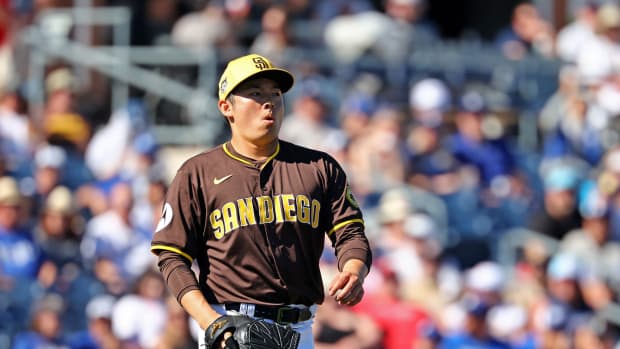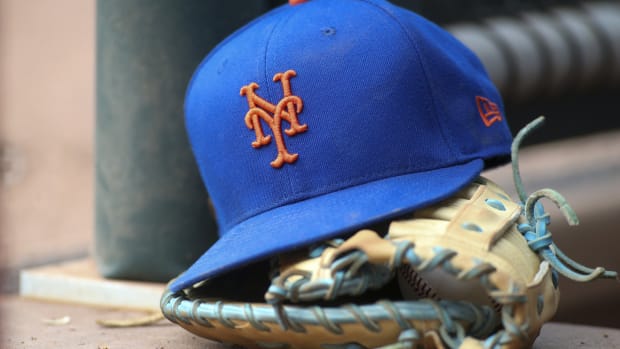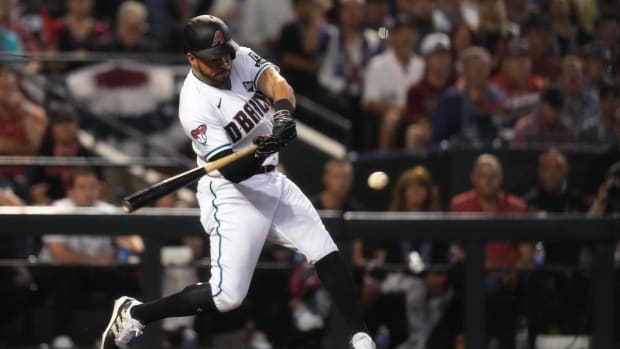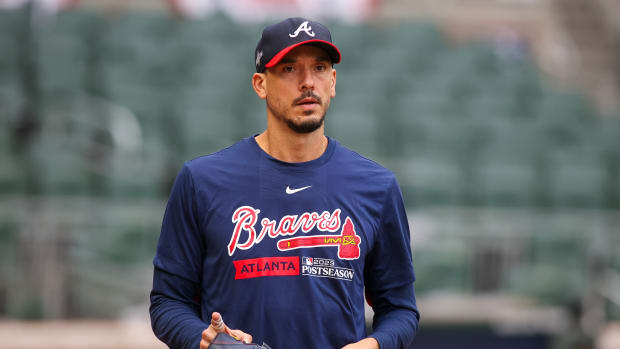How MLB May Pursue Latest Allegations Against Addison Russell
Chicago Cubs shortstop Addison Russell, who last season served 11 games of a 40-game suspension for violating MLB’s domestic violence policy, has now been accused of neglecting a court order to pay child support. If MLB commissioner Rob Manfred concludes that Russell failed to pay required child support, Manfred could rule that Russell violated the domestic violence policy for a second time. The policy contemplates that a disciplined player who is subject to a treatment plan may be compelled to comply with court-ordered child support requirements.
Russell’s path from potential to suspicion
It was only a few years ago when Russell was one of baseball’s most promising players. The 24-year-old Floridian was drafted by the Oakland A’s in the first round (11th overall) of the 2012 MLB Draft. Two years later, the A’s shipped Russell to the Cubs in a trade for Jeff Samardzija and Jason Hammel. Russell became the Cubs’ starting shortstop in 2015. A year later, he belted 21 home runs and knocked in 95 RBIs. He appeared to be on his way to stardom.
Yet by 2017, Russell’s nascent career had already entered a downward spiral. As a player, Russell struggled at the plate. Much more concerning were developments off-the-field.
Cubs Tender Contract to Addison Russell Amid Suspension for Domestic Violence
In June of 2017, a woman who claimed to be a friend of Russell’s estranged wife, Melisa Reidy-Russell, made damaging accusations against Russell on Instagram. She asserted that Russell had viciously attacked Reidy-Russell in front of their two children. The posts came only a few weeks after Reidy-Russell, who had filed for divorce on June 21, claimed that her husband had cheated on her. Russell denied the assault allegations and denounced them as “false and hurtful.”
MLB then launched an investigation into Russell’s alleged domestic violence. Keep in mind, Russell had not been charged with a crime nor there was there any record of a police investigation. Likewise, while Reidy-Russell had filed for divorce, she had not filed a battery lawsuit against her husband.
Russell and the Joint Domestic Violence Policy
MLB needed no court filing or police record in order to launch a probe into allegations against Russell. Likewise, MLB could determine a violation and justify a punishment without such documentation. This is because MLB could rely on the sweeping legal powers accorded to Manfred in the Joint Domestic Violence, Sexual Assault and Child Abuse Policy (“policy”). The policy was crafted in 2015 pursuant to negotiations between the league and the Major League Baseball Players’ Association.
The policy expressly places investigatory powers for “all allegations of domestic violence, sexual assault, and child abuse in the Baseball community” into the hands of the commissioner. Further, the commissioner is furnished broad authority to determine if a violation occurred. In other words, Manfred needn’t rely on an unambiguous admission, an adverse court ruling or damning sworn testimony to conclude that a player is guilty. A disturbing social media post—which, like all social media posts, is not made under penalty of perjury and doesn’t require proof—could in theory provide sufficient grounds.
The commissioner also determines an appropriate level discipline, without any constraint of a “minimum or maximum penalty.” As part of this power, the commissioner can place an investigated player on paid administrative leave for up to seven days. The fact that the player on leave continues to be paid reflects that the commissioner has not yet determined if the player violated the policy but that the allegations are serious enough that the player ought to be separated from his team.
Mother of Addison Russell's First Child Alleges Prolonged Mistreatment
The commissioner’s authority is not without any check. Players can appeal a disciplinary finding to a three-person arbitration panel. One of the panelists is picked by MLB, another is picked by MLBPA and the third is an impartial, neutral arbitrator who is selected by both MLB and MLBPA. The panel is permitted to consider aggravating and mitigating factors. In general, the panel attempts to determine if the commissioner possessed just cause to find fault and to issue an accompanying punishment.
While Manfred enjoys significant discretion in investigating Russell, he is nonetheless constrained by the investigative limitations of a non-governmental body. MLB is a private entity. It thus lacks subpoena power. As a practical matter, this means MLB can’t force witnesses to comply with league interview requests, just like MLB can’t compel witnesses to turn over emails, texts and other potentially pertinent evidence. Further, witnesses who agree to speak with MLB investigators do so without having to swear to the tell the truth. Witnesses, therefore, speak without the threat of being charged for perjury if they knowingly lying. This means they might be more inclined to lie, exaggerate or omit—all of which would interfere with an accused player receiving basic fairness.
According to published reports, MLB was unable to interview Reidy-Russell about allegations raised by a third party (her alleged friend) about how Russell’s conduct. This is because Reidy-Russell declined MLB’s interview requests. As explained above, she was under no obligation to speak with MLB. Most likely for privacy reasons she declined MLB’s invitation. Without the ability to corroborate the allegations and assess witnesses’ veracity, MLB refrained from finding Russell at fault.
Impact of a blog post on MLB’s investigation into Russell
MLB kept the investigation into Russell open into 2018. The investigation took a dramatic turn in September when Reidy-Russell wrote an alarming blog post about her past relationship with Russell. She waited until after her divorce was finalized to open up about her experiences.
In her post, Reidy-Russell leveled serious accusations of physical and emotional abuse against her ex-husband. MLB, in turn, placed Russell on administrative leave while it reviewed the new claims. Under the policy, Russell was obligated to cooperate with the investigation and comply with an interview request. In early October, Manfred announced that, based on a review of all “available” evidence, Russell had violated the policy. Manfred then suspended Russell, without pay, for 40 games and ordered him to receive treatment. Russell declined to appeal Manfred’s ruling.
As noted above, Manfred could have suspended Russell for any length of games. Yet “could” and “should” are different concepts when assigning punishments—particularly given the player’s right to appeal to a neutral arbitrator. Manfred, an attorney by trade, likely crafted a punishment that would logically fit the precedent of MLB’s other domestic violence punishments and that would also prove appropriate given the relative severity of the allegations and certainty of the investigation’s findings. The absence of a law enforcement record probably also played a meaningful role in Manfred’s calculus. Had such a record existed, it would have helped Manfred corroborate (or refute) claims and authenticate (or disprove) allegations.
TAYLER: Why Aren't the Cubs in the Market for Manny Machado or Bryce Harper?
Russell’s punishment was noticeably shorter than that of several other MLB players suspended for domestic violence. Take former San Diego Padres pitcher José Torres, who Manfred suspended for 100 games in June. In December 2017, Torres was charged with assault with a deadly weapon following accusations that he pointed a semiautomatic handgun at his wife and also kicked a door that injured her leg. While every domestic violence incident is difficult to compare, the incident involving Torres led to serious injury and criminal charges (and in November, Torres pleaded guilty to attempted aggravated assault). In contrast, Russell’s alleged incident did not lead to such legal or health outcomes.
As another point of contrast, Manfred suspended pitcher Roberto Osuna for 75 games in June. Like the domestic incident involving Torres and unlike the one involving Russell, Osuna’s domestic violence incident had legal entanglements. In May, Toronto authorities charged Osuna with assaulting the mother of his 3-year-old son. Baseball placed Osuna on administrative leave while it conducted an investigation. A month later, Manfred suspended Osuna for 75 games. In September, Osuna reached a peace bond (essentially a plea deal) with prosecutors whereby the charge was lifted so long as Osuna refrained from contacting his alleged victim and also undergo counseling. The alleged victim had returned to Mexico and declined requests to testify in Canada; it’s unclear if MLB’s investigation included discussions with the alleged victim.
Latest allegations against Russell could lead to a lengthier suspension and other consequences
The most recent allegation against Russell has been brought by Mallory Engstrom, the mother of Russell’s daughter. It comes just weeks after the Cubs decided to retain Russell by tendering him a contract for 2019. In an Instagram post on Wednesday, Engstrom says that Russell “abandoned” her daughter. She also accuses Russell and his “team of advisors” of disobeying court-ordered child support and that when Russell—who has earned $7.3 million in his career—has paid child-support he has sometimes done so in quarters and dollar bills. In addition, she insists that Russell has arranged for the Cubs to “block [her] from social media as an attempt to silence [her].”
Engstrom’s post does not claim that Russell committed domestic violence. Nonetheless, the post refers to a possible violation under the policy. The policy concerns three types of misconduct: domestic violence, sexual assault and child abuse. The focus on harm to children is intentional. The policy makes clear that a punished player’s treatment plan “may require him to submit to psychological evaluations, attend counseling sessions [and] comply with court orders including child support orders . . . ” A sanctioned player’s plan is determined by a so-called “joint policy board,” which consists of experts and includes representatives appointed by both MLB and MLBPA.
If Russell’s treatment plan requires that he comply with court-ordered child support, Engstrom’s post will raise alarm bells for MLB officials. At a minimum, MLB will likely investigate the status of any child support orders related to Russell. Such a probe would include discussions with Russell’s attorneys and a thorough review of available court records. It would likely also include an attempt to interview Engstrom and a request that she provide documentation to support her claims. As noted above, Engstrom wouldn’t need to comply with such demands—MLB has no subpoena power and no contractual authority over Engstrom.
MCCANN & RAIOLA: How State Taxes Could Affect Where Bryce Harper and Manny Machado End Up
To be fair to Russell, Engstrom leveling claims against him in an Instagram post does not make them true or accurate. She also claims the Cubs have “blocked” her from social media. While it’s possible the Cubs social media staff have used block features to block her (and others), the contention that Russell engineered the blocking would need to be validated. Likewise, MLB investigators will want to evaluate whether the claims are supported by evidence. For his part, Russell has assured media that he is complying with the treatment plan.
MLB also need not rush the investigation. The regular season doesn’t start for another 15 weeks and Russell still has 29 games to serve on his suspension. Still, MLB will move at a pace that ensures it can fully investigate the claims. If MLB finds that Russell has misled the league, his suspension could be elongated.
Meanwhile, the Cubs will likely wait for MLB to take any action. The team knows that Russell will not be available for the first 29 games of the 2019 season and that it won’t be paying him for those missed games. If Russell’s suspension is extended, he could appeal or accept.
To the extent Russell has endorsement deals, any allegation could prove problematic. Most endorsement deals contain “morals clauses” that allow the sponsored company to exit if the player attracts controversy. Given Russell’s on-going controversies, it’s possible that he has already become familiar with the responsibilities inherent in moral clauses.
SI will keep you updated on Russell’s status.
Michael McCann is SI’s legal analyst. He is also Associate Dean of the University of New Hampshire School of Law and editor and co-author of The Oxford Handbook of American Sports Law.


































